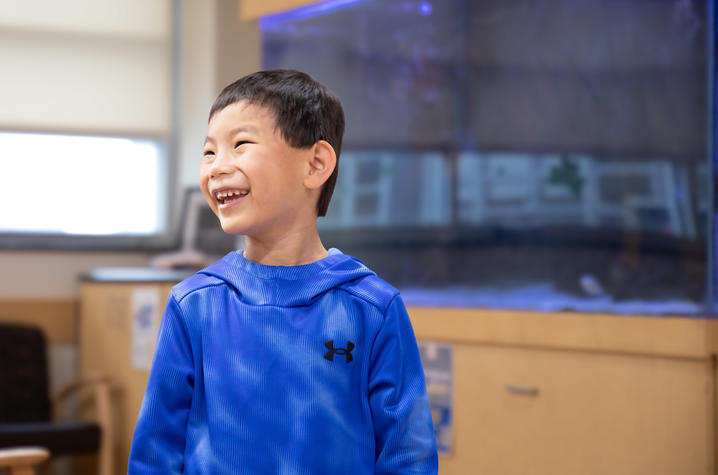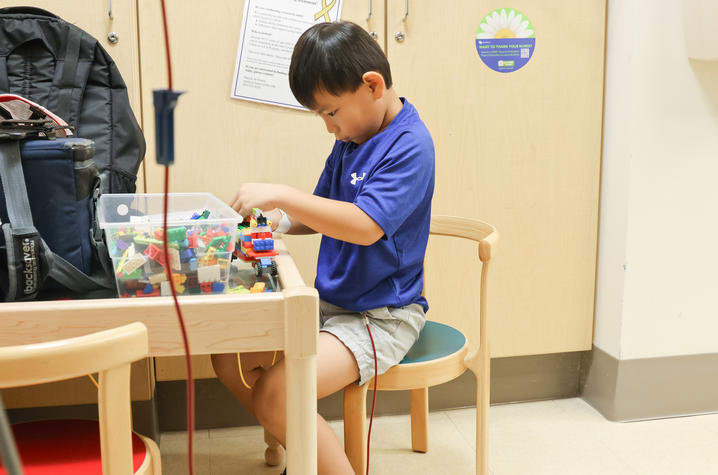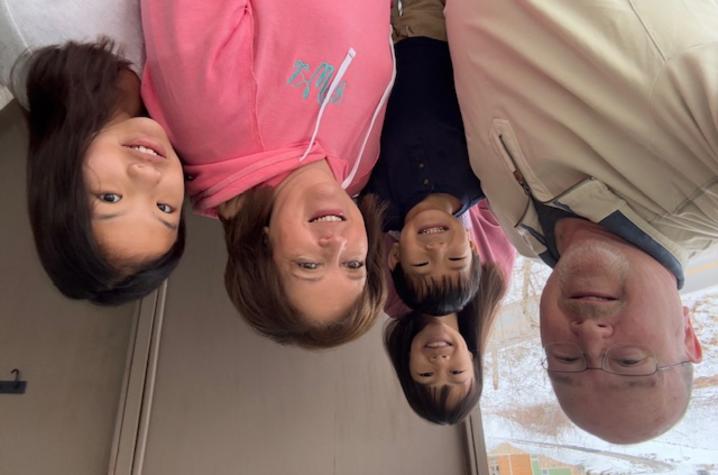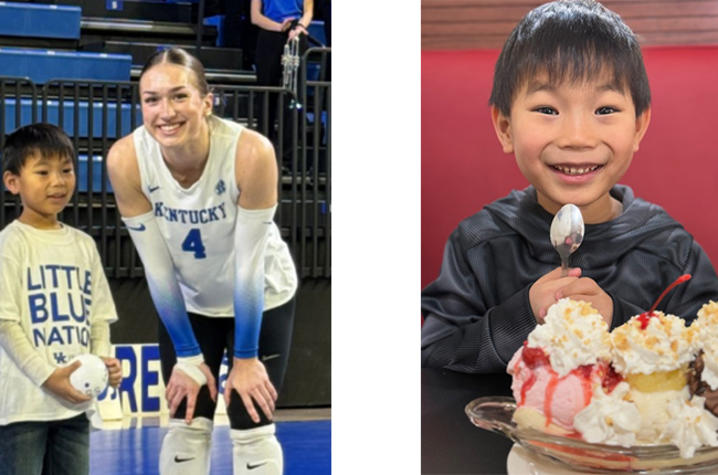KCH patient’s strength runs on love, Legos and lifesaving blood
LEXINGTON, Ky. (March 28, 2025) – Eight-year-old Noah West is braver than most adults.
Unbothered by the sight of a needle. At ease in all medical settings. And he looks forward to every medical appointment.
Which is a good thing, considering that once every two weeks, Noah receives a blood transfusion in the DanceBlue Kentucky Children’s Hospital Hematology/Oncology Clinic.
For as long as Noah can remember, he and his dad Sam travel from their Bourbon County Kentucky home to Lexington, stopping for breakfast along the way. This is the routine for what they call their “guys’ day.” Once they check in at the clinic, it’s time for vitals and a quick physical exam, followed by an antibody screening to make sure the donor blood is a good match for Noah. Then it’s time for the transfusion, administered through a permanent port in Noah’s chest. As the donor blood works its way through his body, Noah builds with Legos, plays games on his Nintendo Switch or watches television while Sam works on his laptop. From beginning to end, they spend about eight hours in the clinic. Two weeks later, they come back and do it all again.
Such is life with the rare blood disorder beta thalassemia major, also called Cooley’s anemia. Noah’s body can’t produce enough hemoglobin and healthy red blood cells. Without the regular transfusions, Noah would become severely anemic, the lack of oxygenated red blood cells adversely affecting bone growth and hormone development, along with extreme fatigue, muscle weakness and dizziness.
Noah has the most severe type of thalassemia, and the side effects of having regular transfusions come with their own risks. Noah can develop an excess of iron in his blood, which could in turn lead to organ damage; he takes chelation medication to flush out the accumulating iron. Sam acknowledges that managing a serious disease with a complicated treatment can be a challenge, but it’s one that he and his wife Greta knew they could handle.
The Wests adopted Noah from China when he was two years old. They knew all about his condition, and the lifelong treatment it required. After raising five children, Sam and Greta knew their work as parents was far from done. After they adopted two little girls from China, they knew they had to go back for Noah.
“When we saw his face, we knew that was our son,” said Greta. “We knew whatever it was, we could handle it.”
The Wests schedule life around Noah’s transfusions. They can tell when it’s time for one by his energy level. During a trip to an amusement park, Noah was so fatigued that they had to cut the day short. Even a trip to the grocery store with Greta is too taxing.
As Sam describes the changes in Noah just before and immediately after a transfusion — as different as night and day — Noah stops to briefly consider what it would be like if Spider-Man was a blood donor. Would Noah get his superpowers? After a few moments of thought, Noah turns his attention back to his Legos.
Noah’s life is entirely dependent on the generosity of strangers — blood donors. Forty percent of blood collected by the Kentucky Blood Center (KBC) goes to patients at UK HealthCare. When UK fans face off against their opponents in the Big Blue Slam or the Big Blue Crush, there’s more than local pride at stake. For patients like Noah, it’s life or death.
To date, Noah has had 113 transfusions. That’s 113 people who stepped up at blood drive or KBC donation center. For Sam and Greta, the thought of complete strangers giving literal life to his son is often overwhelming.
“We can never thank people enough for donating blood,” said Greta. “I’m just so thankful that you give. I’m just thankful for people that will give blood to let us have him in our lives.”
“I donate blood, sometimes I would get a little queasy, so I try to put a face with it,” said Sam. “I look at Noah, and if he can go through this 113 times and not have a problem, I can do it. That's a simple thing that you can do. Everybody needs blood, at one point or another. We will probably need a transfusion or some blood in our life.”
There may be a day, perhaps in the not-to-distant future, when Noah won’t need his bimonthly transfusions anymore. There’s a gene therapy, newly approved by the FDA, that the Wests are hopeful Noah could get one day. Beta thalassemia major is caused by a faulty genetic information in the hemoglobin, the protein in red blood cells that carries oxygen. If the body is like a computer, the genetic information is the programming; Noah is missing the key genetic information that produces healthy red blood cells. The gene therapy works by inserting functional copies of the code into the patient’s own cells.
But Noah isn’t too sure about this. He may not completely understand what’s happening to him, but he does know that being cured would mean no more trips to see his friends at the DanceBlue Clinic. The providers and staff have become extended family. The UK students who volunteer in the clinic stop by to hang out and play games with Noah. And what would become of his regular “guys’ days” with his dad? Nope, he’s just fine with the way things are.
Just as well, says Sam. Their insurance company considers the therapy to be experimental and won’t cover it. The estimated out-of-pocket cost is over a million dollars.
So, until the therapy is available, or when Noah is old enough to make the trip by himself, he and Sam will carry on with their regular “guys’ days” while Greta holds down their home fort in Paris with Noah’s two sisters. The weeks between transfusions are like any other for an 8-year-old boy; he loves to swim, annoy his sisters and spend time with his big family. For Sam and Greta, every day with Noah is a blessing. And every day, they give thanks to the blood donors who make those daily blessings possible.
“Even though he’s adopted, he’s my son,” Sam said. “I wouldn’t want anything to happen to him. It doesn’t lessen the degree of love I have for him. It’s definitely a scary undertaking. Only with God’s help and blood donors are we able to manage through it.”
UK HealthCare is the hospitals and clinics of the University of Kentucky. But it is so much more. It is more than 10,000 dedicated health care professionals committed to providing advanced subspecialty care for the most critically injured and ill patients from the Commonwealth and beyond. It also is the home of the state’s only National Cancer Institute (NCI)-designated Comprehensive Cancer Center, a Level IV Neonatal Intensive Care Unit that cares for the tiniest and sickest newborns and the region’s only Level 1 trauma center.
As an academic research institution, we are continuously pursuing the next generation of cures, treatments, protocols and policies. Our discoveries have the potential to change what’s medically possible within our lifetimes. Our educators and thought leaders are transforming the health care landscape as our six health professions colleges teach the next generation of doctors, nurses, pharmacists and other health care professionals, spreading the highest standards of care. UK HealthCare is the power of advanced medicine committed to creating a healthier Kentucky, now and for generations to come.









